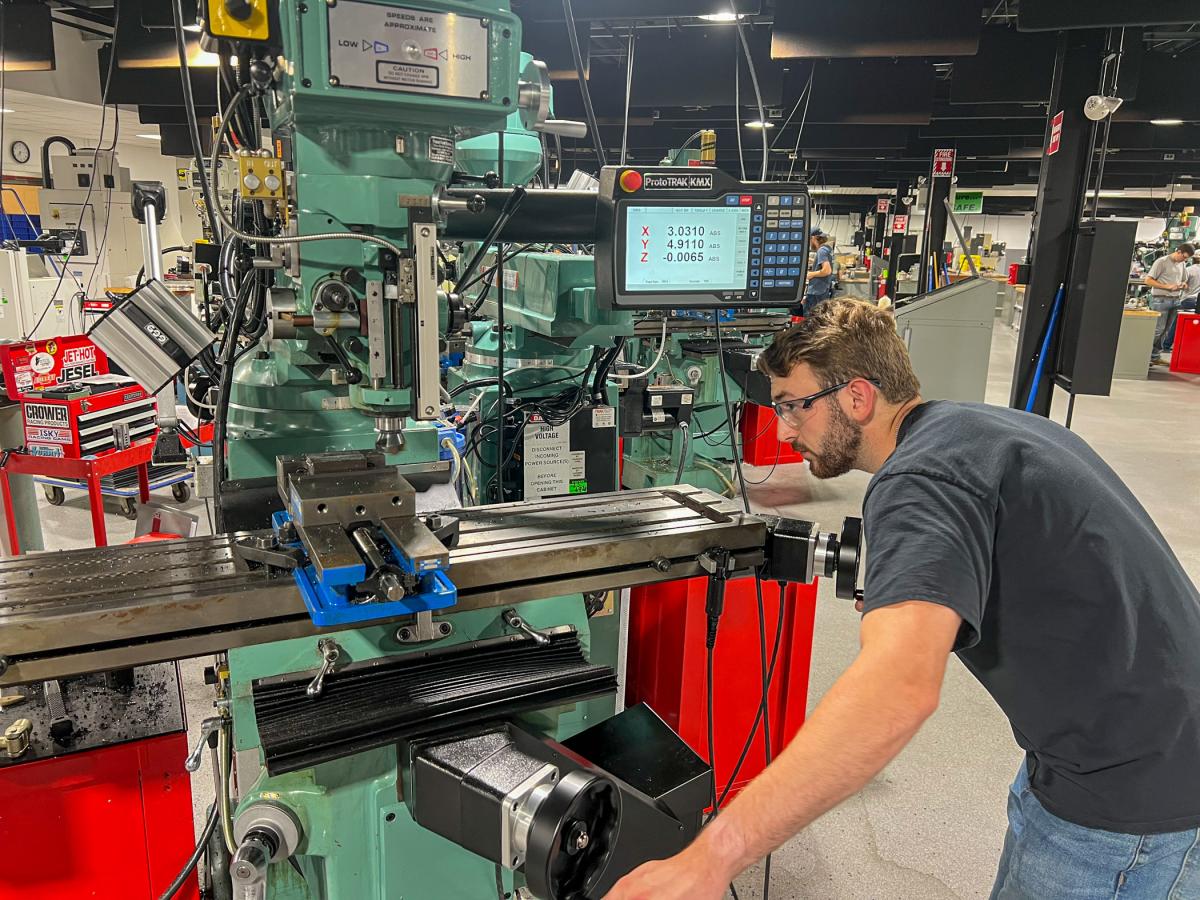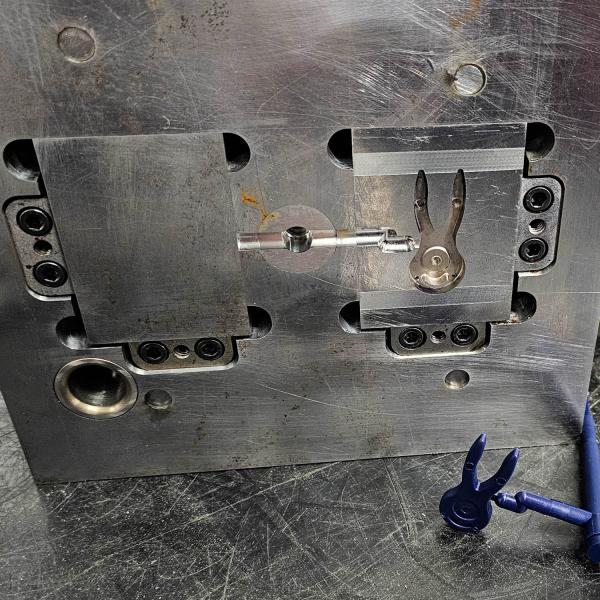Interdepartmental synergy ‘molds’ opportunity for students
Wednesday, April 3, 2024
Photos courtesy of Matthew A. Nace, adjunct instructor and alumnus
A collaboration between academic departments at Pennsylvania College of Technology is “molding” a unique opportunity for polymer engineering technology students.
In the seventh-semester class Building Molds & Dies, students swap three hours a week in their plastics labs for hands-on work in the Larry A. Ward Machining Technologies Center. The course requires students to machine – from a chunk of metal – the mold for a plastic part they designed. The students produce the item via injection molding at the end of the semester.
“You need high-tech machining equipment to handle the tolerances in mold design. Many colleges offering polymer engineering programs can’t provide that essential machining component. We can in a 14,299-square-foot facility with industry-standard mills, lathes, CNC machines and EDM technology,” stated Bradley M. Webb, dean of engineering technologies. “The experience is one of many reasons that our polymer engineering grads have a 100% overall job placement rate.”

Andrew B. Folk, of Bernville, majoring in polymer engineering technology at Pennsylvania College of Technology, lines up his tooling in the Larry A. Ward Machining Technologies Center. As part of the Building Molds & Dies course, polymer engineering technology students machine a mold for a plastic part they designed. Students produce the item via injection molding at the end of the semester.
“It’s very easy for students to design something on the computer, and if it works or doesn’t work, they’ll have no idea,” said Adam C. Barilla, assistant professor of plastics and polymer technology and co-department head. “To ensure the part they designed works, we want the students to go through the entire process, experience that missing piece of making the part.”
The students use mills, surface grinders and electrical discharge machines to accomplish that goal under the supervision of adjunct instructor and alumnus Matthew A. Nace, a retired mold maker. Nace earned an associate degree in toolmaking technology in 1993 and complemented his studies with several plastics courses.
“The students experience all aspects of building the mold for the part they design,” Nace said. “Going from concept to actually making the part is unique. For the students, it’s a cool thing.”
Blake Kane, of Coal Township, and Andrew B. Folk, of Bernville, are scheduled to graduate next month with bachelor’s degrees in polymer engineering technology. They were two of 11 students in the most recent Building Molds & Dies course and part of small groups that designed and machined molds.
Kane’s crew produced a cable divider, and Folk’s group manufactured a divot tool for golfers.
“The thing I enjoyed most about the project was getting to see the process from start to finish,” Folk said. “We started with a block of metal and turned it into a working mold that was able to produce parts we designed. Allowing me to know the process showed me what works with a design and what doesn’t.”
“My favorite part of the process was translating the dimensions and tolerances from the blueprint to metal,” Kane added. “That may sound easy, but let’s just say we all have a great appreciation for machinists. I am thrilled to have been given this opportunity and am confident that it will greatly contribute to my career development.”
That’s the whole point of the curriculum crossover, according to Barilla.
“This is their one time to design and see a product all the way through. It will absolutely help them later on. They get to walk a semester in the shoes of the person making the mold. I think that’s super helpful,” he stressed. “There are so many intricacies that you don’t think about while designing on the computer that show up in real life when machining the mold. Understanding that and the machining process, they can make their design easier and cheaper to manufacture.”
Building Molds & Dies is the third leg of a trifecta of interrelated courses that students take concurrently. Mold & Die Design teaches the theory of mold design. Designing Molds & Dies requires students to apply that theory and make a blueprint of their mold design. They follow that blueprint when machining the mold in the Building Molds & Dies class.
“Just making the block with the mold cutout takes most of the semester,” Barilla said.
During finals week, the students return to familiar surroundings – the college’s injection molding lab – to manufacture their part. Injection molding is commonly used to make medical and automotive components. It requires high pressure to push heated plastics into a metal box, known as the mold frame. The frame contains a cutout – the mold – in the desired shape of the part. Once the mold is cooled, the part is ejected.
In addition to their mold, students machine a metal piece that aligns with the ejection pins responsible for forcing the finished part out of the mold.
The Building Molds & Dies course has been part of the curriculum for five years, the result of a collaboration between Barilla, the plastics pro, and Nace, the veteran mold maker. The initial three years of the course were devoted to building the 9-by-8.5-by-9-inch mold frame that now holds the molds crafted by the students.
“It’s awesome to have Matt,” Barilla said. “I don’t know how we would do it without him. His machinist background is part of it, but he also knows the intricacies of how these unique components work. That’s a pretty specialized skill set.”
Kane and Folk echoed Barilla’s sentiment.
“Without Mr. Nace, this wouldn’t have been possible,” Kane said. “He walked us through every step of the process and made sure we didn’t mess anything up too badly.”
“He showed us how to do each step, then allowed us to do it ourselves,” Folk said. “And he was always there to provide assistance when needed.”
Nace considers himself the fortunate one.
“I’m lucky to teach these kids. They are excellent students. And the plastics faculty do a top-notch job teaching them,” he said.
Penn College is one of seven institutions nationwide offering plastics degrees that are accredited by the Engineering Technology Accreditation Commission of ABET. The college is also home to the Plastics Innovation & Resource Center, one of the top plastics technology centers in the nation for research, development and education related to injection molding, extrusion, blow molding, rotational molding and thermoforming.
To learn more about the PIRC, call 570-321-5533.
For information on the polymer engineering degrees and other majors offered by Penn College’s School of Engineering Technologies, call 570-327-4520.
Penn College is a national leader in applied technology education. Email the Admissions Office or call toll-free 800-367-9222 for more information.


